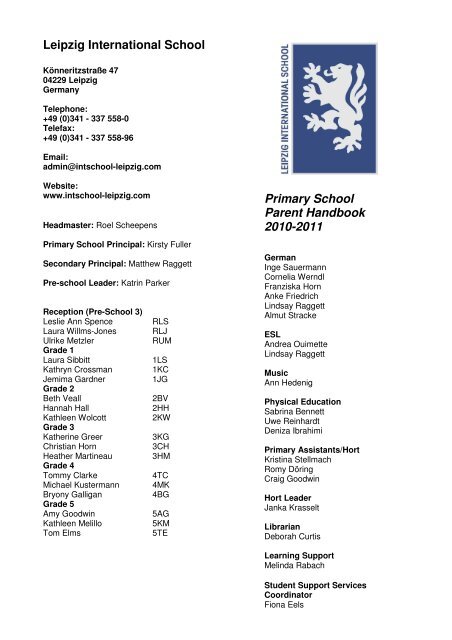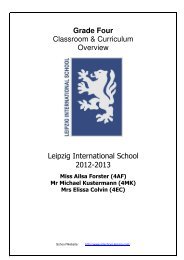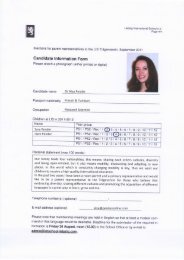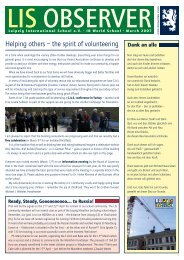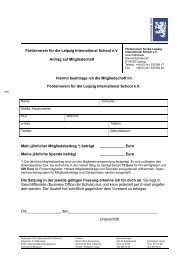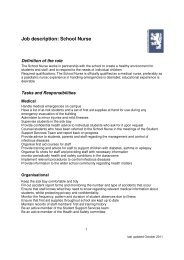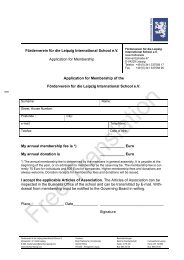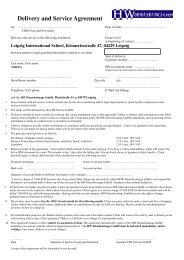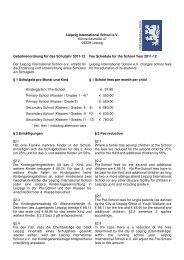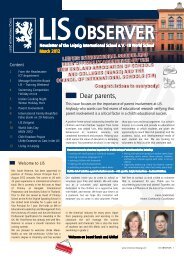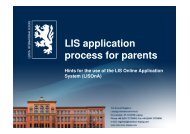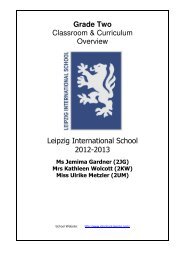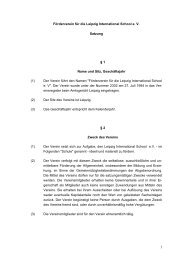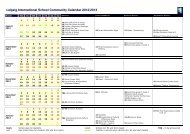Parent Handbook 10-11 - Leipzig International School
Parent Handbook 10-11 - Leipzig International School
Parent Handbook 10-11 - Leipzig International School
You also want an ePaper? Increase the reach of your titles
YUMPU automatically turns print PDFs into web optimized ePapers that Google loves.
<strong>Leipzig</strong> <strong>International</strong> <strong>School</strong><br />
Könneritzstraße 47<br />
04229 <strong>Leipzig</strong><br />
Germany<br />
Telephone:<br />
+49 (0)341 - 337 558-0<br />
Telefax:<br />
+49 (0)341 - 337 558-96<br />
Email:<br />
admin@intschool-leipzig.com<br />
Website:<br />
www.intschool-leipzig.com<br />
Headmaster: Roel Scheepens<br />
Primary <strong>School</strong> Principal: Kirsty Fuller<br />
Secondary Principal: Matthew Raggett<br />
Pre-school Leader: Katrin Parker<br />
Reception (Pre-<strong>School</strong> 3)<br />
Leslie Ann Spence RLS<br />
Laura Willms-Jones RLJ<br />
Ulrike Metzler RUM<br />
Grade 1<br />
Laura Sibbitt 1LS<br />
Kathryn Crossman 1KC<br />
Jemima Gardner 1JG<br />
Grade 2<br />
Beth Veall 2BV<br />
Hannah Hall 2HH<br />
Kathleen Wolcott 2KW<br />
Grade 3<br />
Katherine Greer 3KG<br />
Christian Horn 3CH<br />
Heather Martineau 3HM<br />
Grade 4<br />
Tommy Clarke 4TC<br />
Michael Kustermann 4MK<br />
Bryony Galligan 4BG<br />
Grade 5<br />
Amy Goodwin 5AG<br />
Kathleen Melillo 5KM<br />
Tom Elms 5TE<br />
Primary <strong>School</strong><br />
<strong>Parent</strong> <strong>Handbook</strong><br />
20<strong>10</strong>-20<strong>11</strong><br />
German<br />
Inge Sauermann<br />
Cornelia Werndl<br />
Franziska Horn<br />
Anke Friedrich<br />
Lindsay Raggett<br />
Almut Stracke<br />
ESL<br />
Andrea Ouimette<br />
Lindsay Raggett<br />
Music<br />
Ann Hedenig<br />
Physical Education<br />
Sabrina Bennett<br />
Uwe Reinhardt<br />
Deniza Ibrahimi<br />
Primary Assistants/Hort<br />
Kristina Stellmach<br />
Romy Döring<br />
Craig Goodwin<br />
Hort Leader<br />
Janka Krasselt<br />
Librarian<br />
Deborah Curtis<br />
Learning Support<br />
Melinda Rabach<br />
Student Support Services<br />
Coordinator<br />
Fiona Eels
Table of contents<br />
LIS Primary Overview…………………………..…………………......... 3<br />
Curriculum…………………………………………………………………. 3<br />
Student Support Services .…………………………………………… 4<br />
Assessment of Students………………………………………………… 4<br />
Reports and Portfolios ………………………………………………… 5<br />
Code of Conduct………………………………………………………….. 6<br />
The House System………………………………………………………... 7<br />
Assembly…………………………………………………………………… 7<br />
General Information………………………………………………………. 8<br />
Attendance and Punctuality…………………………………………….. 9<br />
Illness……………………………………………………………………….. 9<br />
Medication………………………………………………………………….. 9<br />
Holidays…………………………………………………………………….. 9<br />
Snacks and Lunch………………………………………………………… <strong>10</strong><br />
Supplies…………………………………………………………………….. <strong>10</strong><br />
Hort………………………………………………………………………….. <strong>11</strong><br />
General Rules……………………………………………………………… <strong>11</strong><br />
Homework………………………………………………………………….. 12
LIS Primary <strong>School</strong> Structure<br />
The LIS primary school consists of Reception – Grade 5 with children from age 5 - <strong>11</strong>. (Children<br />
are accepted into Grade 1 at the age of 6.) The school day begins at 08.45 and finishes at<br />
15.00. There are two breaks during the day; a 30-minute snack and outside playtime in the<br />
morning and a 55-minute lunch break. Hort (before and after-school supervision) is currently<br />
offered to children in Reception to Grade 5. It is available from 8.00 – 8.40 and 15.00 – 17.00.<br />
An overview of the day<br />
08:00-08.45 Hort (supervision)<br />
08:45-09:00 Registration<br />
09:00-09:45 Period 1<br />
09:45-<strong>10</strong>:30 Period 2<br />
<strong>10</strong>:30-<strong>10</strong>:40 Snack<br />
<strong>10</strong>:40-<strong>11</strong>:00 Outside Break<br />
<strong>11</strong>:05-<strong>11</strong>:50 Period 3<br />
<strong>11</strong>:50-12:35 Period 4<br />
12:35-13:30 Lunch and Outside Break<br />
13:30-14:15 Period 5<br />
14:15-15:00 Period 6<br />
15:00-17:00 Hort (supervision)<br />
Hort and Extra-curricular Activities<br />
The core school day is from 8.45 until 15.00. Supervision is provided before school from 8.00<br />
until 8.45. After-school activities are available in Hort from 15.00 until 17.00.<br />
(More information can be found under General Information.)<br />
Curriculum<br />
From Reception to Grade 5 students follow the Cambridge <strong>International</strong> Primary Programme<br />
(CIPP). This consists of an established programme of study, specifically developed for<br />
international students, in mathematics, language and literacy and science. In addition,<br />
students study German, history, geography, ICT (Information and Communication<br />
Technology), music, art and PE as well as PSHE (Personal Social and Health Education) and<br />
citizenship.<br />
Further details about the curriculum can be found on the school website at<br />
www.intschool-leipzig.com<br />
The language of instruction is English. ESL (English as a Second Language) is available to<br />
help children attain a skill level in speaking, reading and writing English which enables them to<br />
participate quickly in mainstream lessons.<br />
At the end of Grade 4 the school is authorised to issue a “Bildungsempfehlung”. This is a<br />
recommendation for further education within the German system. Our courses do not<br />
specifically prepare children to enter the German education system and few children leave<br />
after Grade 4. <strong>Parent</strong>s who wish to receive a “Bildungsempfehlung” should notify the school via<br />
the Grade 4 class teachers early in the year as your child enters Grade 4.<br />
Confidential Page 3 16/<strong>11</strong>/20<strong>10</strong>
Student Support Services<br />
LIS has a Students Support Services Coordinator, who liaises with various support staff.<br />
English as a Second Language<br />
The ESL programme at the Primary <strong>School</strong> focuses on the 4 language skills (reading, writing,<br />
listening and speaking) in a fun and dynamic way. The goal of the programme is to give<br />
students sufficient English to be able to access content and language within the mainstream<br />
classroom, by teaching them in small groups and providing targeted language instruction. The<br />
ESL department uses small group work, projects, drama, games, and a variety of written<br />
materials to practice skills and expose children to English in a pleasurable, focused<br />
environment. While the focus is on language, class tasks seek to build up linguistic knowledge<br />
around a theme or content area. Most of our work with ESL students is out of the homeroom<br />
classroom (pull-out) but some inclusion teaching is also done (with the ESL specialist in the<br />
homeroom, working with the classroom teacher to help English language learners).<br />
Because of the proven benefits of developing a strong Mother Tongue, LIS celebrates and aims<br />
to foster growth in all our students’ languages. English language learners are therefore<br />
encouraged to develop their Mother Tongue while improving their English proficiency. We are<br />
happy to meet with parents to discuss ways to help your child’s language development.<br />
Other Academic Support<br />
The Learning Support Department currently consists of one Learning Support Teacher and 3<br />
assistants. The role of this department is to provide support for children who are finding it<br />
difficult to access the curriculum. Support most often takes place within the classroom, although<br />
small groups or individuals may be withdrawn for targeted support. The Learning Support<br />
Teacher also liaises with other specialist teachers, meets parents, provides a link with outside<br />
agencies and advises classroom teachers.<br />
CAS (Community-Action-Service) Students<br />
At times CAS (Community-Action-Service) students from the Secondary <strong>School</strong> volunteer their<br />
time to work with different primary classes. All support is closely coordinated by the homeroom<br />
teacher.<br />
Assessment of Students<br />
Essentially there are two types of assessment going on in the primary school:<br />
Formative assessment<br />
This is an integral part of daily teaching and learning. Teachers continually monitor and assess<br />
the students to determine what they already know in order to plan the next stage of learning.<br />
Formative assessment and teaching are directly linked; neither can function effectively and<br />
purposefully without the other.<br />
Summative assessment<br />
This happens at the end of a teaching and learning block and gives the students opportunities<br />
to demonstrate what they have learned.<br />
Assessment is an ongoing and important part of school life and is carried out by both teachers<br />
and students throughout the year. Progress is monitored and reported in different ways; through<br />
student-led conferences, written progress reports, portfolios and formal and informal meetings.<br />
Confidential Page 4 16/<strong>11</strong>/20<strong>10</strong>
Reports<br />
Formal written reports are sent home twice a year, in December and June.<br />
Student-led conferences take place twice a year; one after the first report, issued in December<br />
and the second in March/April.<br />
The "Student-Led Conferences" will be held during our regular parent-teacher conference time.<br />
You can expect to receive a personal invitation from your child with a scheduled time to share<br />
and discuss his/her work.<br />
Informal communication and feedback is also provided through the homework diaries, which<br />
parents are requested to check regularly. Additional meetings can be scheduled with teachers<br />
by request.<br />
Grades<br />
Grades are not given on the reports in the primary school. Instead, grading is done on a scale.<br />
Teaching objectives (goals for the year) are listed and the children are marked according to the<br />
following: A tick is placed in the column marking the level at which each individual is working.<br />
The rubric used for assessment is outlined below and can be found on each page of the reports.<br />
Rubric:<br />
Not applicable This has not been assessed this term<br />
Not meeting Not meeting grade level objectives, working below grade level<br />
Working towards Working towards meeting grade level objectives<br />
Meeting Meeting grade level objectives, working at grade level<br />
Meeting and extending Meeting and extending beyond grade level objectives<br />
Extending Extending beyond grade level objectives<br />
(Meeting means that the child is performing at the expected level for the grade at that time of<br />
the year.)<br />
Portfolios<br />
As a part of our assessment and reporting process at L.I.S we will be implementing Portfolio<br />
assessment in the Primary <strong>School</strong>. Portfolios are a meaningful, ongoing way of documenting<br />
your child’s progress. They provide an opportunity for teachers, parents and children to be<br />
directly involved in their preparation and are an authentic, student-centred means of assessing<br />
children’s learning.<br />
A student’s portfolio is a book containing evidence of learning. The purpose is to evaluate<br />
students’ knowledge, skills and accomplishments by providing samples of learning tasks. This<br />
special book will go home at the end of each term, and your child will have the opportunity to<br />
conduct a "Student-Led Conference" at the end of Term 2, during which they will discuss their<br />
portfolio with you and their teacher.<br />
A major goal of portfolio assessment is to promote student-centred learning. By being directly<br />
involved in the compilation of the portfolio, students are empowered to take responsibility for<br />
their learning. They are actively involved in the process of compiling the portfolio. Each student<br />
chooses work samples, assesses their own work, reflects on their learning and sets goals for<br />
themselves. The portfolio encourages students to reflect on areas of learning that they are<br />
good at and areas that are challenging. They are involved in decisions about how they can<br />
improve their learning.<br />
Confidential Page 5 16/<strong>11</strong>/20<strong>10</strong>
Code of Conduct<br />
The Golden Rules<br />
Every primary classroom has a poster displaying the Golden Rules (developed by Jenny Mosley<br />
a leading author and educational consultant in the area of behaviour management). The<br />
teachers and children review the rules at regular intervals and they form the basis of our<br />
expectations of how we treat each other. They also form a central part of weekly assemblies<br />
which explore behaviour and the choices we make. The assemblies also reward and celebrate<br />
individual achievement in a range of areas.<br />
We are gentle<br />
(We don’t hurt others)<br />
We are kind and helpful<br />
(We don’t hurt anybody’s feelings)<br />
We listen<br />
(We don’t interrupt)<br />
We are honest<br />
(We don’t cover up the truth)<br />
We work hard<br />
(We don’t waste our own or other’s time)<br />
We look after property<br />
(We don’t waste or damage things)<br />
‘Don’t get into Hot Water!’ or ‘Colour Policy’<br />
LIS Primary operates a colour system of behaviour management in order to reward appropriate,<br />
expected behaviour. It has been designed to appeal to the children and is based around colour<br />
coding. Often children who behave consistently within expectations get overlooked. This system<br />
aims to provide a reward, in the form of the ‘Blue Bash’, for those children. It also acts as an<br />
incentive for those children who find it more difficult to follow the rules and behave within<br />
expectations.<br />
Each child, each day receives a colour strip in the homework diary corresponding to a level of<br />
behaviour. These expected levels are explained very carefully to the children. Children who<br />
consistently demonstrate acceptable behaviour will be rewarded with a "Blue Bash" at the end<br />
of each month. (This means those children with less than two ‘greens’ in a particular month.)<br />
Confidential Page 6 16/<strong>11</strong>/20<strong>10</strong>
The House System<br />
In order to further promote teamwork and to foster a sense of belonging in our expanding<br />
school, LIS primary runs a House System. Each child is allocated to one of four houses (siblings<br />
are ‘housed’ together.) House activities and assemblies promote leadership (especially at the<br />
Grade 5 level) and develop a sense, not only of good sportsmanship but also good team spirit –<br />
being an active and valuable part of a team whether it be in the context of the class, House or<br />
sporting team.<br />
We believe that the House System helps to educate students in the arts of taking part, taking<br />
risks and having a go. Through this system the children learn;<br />
• that sometimes you can’t win but also that not winning does not always mean losing<br />
• not only to work for themselves but to work for each other<br />
• that sometimes, working together can bring about a greater good<br />
• that success, when achieved in collaboration with others is equally as sweet as that<br />
achieved alone<br />
• that taking part and not winning can still bring growth in team spirit and point the way for<br />
success in the future.<br />
The children in the primary school are allocated to one of four houses. Siblings are always<br />
placed together in the same house. The houses are organised vertically; there are children from<br />
every grade level in each house. There are also children from each house in each class. The<br />
teachers are also allocated to houses.<br />
Each house has two Grade 5 House Captains elected by their peers. House Points are awarded<br />
for a wide range of things both academic and other, both for individuals and groups. The points<br />
are totalled weekly and the winning house announced at weekly assemblies.<br />
The four houses are named as follows; each House is also associated with a colour as shown.<br />
Mandela (Green) Curie (Blue)<br />
de Coubertin (Red) da Vinci (Yellow)<br />
Assembly<br />
Weekly assemblies are held for Reception to Grade 5. These meetings are a chance for us to<br />
learn about common issues, to celebrate success and achievement and share and showcase<br />
talents. The assemblies are run by the House Captains, a class or a teacher and consist of<br />
contributions from classes and individuals.<br />
Confidential Page 7 16/<strong>11</strong>/20<strong>10</strong>
General Information<br />
<strong>Parent</strong> Communication<br />
• Home-<strong>School</strong> Communication Folder (Reception and Grade1)<br />
– allows parent and teacher to communicate in writing regarding the child’s needs and<br />
progress.<br />
• Homework Diary (Grades 2 - 5)<br />
– allows parent and teacher to communicate in writing regarding the child’s needs and<br />
progress.<br />
• Teacher Letters<br />
– Some teachers use a regular letter detailing the current topics and suggestions for how<br />
you can further support your child’s learning.<br />
• Observer articles<br />
– Issued six times per year, the articles will update you on Primary and whole school issues<br />
and contains dates of upcoming events.<br />
• Bi-Annual Reports<br />
– A detailed report on your child’s progress. You will receive one in December, and one in<br />
June.<br />
• Student-led Conferences<br />
– Your opportunity to meet with your child and their teacher in December and March/April to<br />
review your child’s progress<br />
• Emails<br />
- You may use email to contact your child’s teacher about general issues although it is better<br />
to use the homework diary or handwritten notes to inform about things which need an<br />
immediate response – teachers will not necessarily see the email in time<br />
Making Contact<br />
Should you have comments, questions, or concerns, please contact the staff member who is<br />
directly responsible first, usually your child's teacher. If you have further questions or issues of a<br />
general nature, it is also possible to set up an appointment with the Primary <strong>School</strong> Principal.<br />
Contact can be made directly, via email or through the school office.<br />
Playground<br />
There is a morning break for all classes and a lunchtime break including time to eat lunch.<br />
Teachers supervise these break times and appropriate student behavior is expected. Playtime<br />
is viewed as a time when children should be able to play freely and safely without adult<br />
intervention. Teachers are always close at hand should they be needed.<br />
Field Trips<br />
Field trips are considered a valuable educational and social experience for all students. Typical<br />
field trips include visits to art galleries and museums, local attractions, overnight trips and any<br />
number of short outings locally. Your child will go on several trips throughout the year. You will<br />
be given details of these trips (any costs, etc.) in advance and you may have the opportunity to<br />
go along as a chaperone. Please understand that field trips count as official school days, and<br />
all students are expected to participate.<br />
After <strong>School</strong> Activities<br />
A range of extra-curricular activities are offered by teachers, parents and external providers.<br />
Information about these can be found on the notice board in the foyer and on the website.<br />
Confidential Page 8 16/<strong>11</strong>/20<strong>10</strong>
Room <strong>Parent</strong>s<br />
At the beginning of the school year, a parent volunteer will be sought to take on the role of room<br />
parent. Those interested should let the teacher know within the first weeks of school. It is the<br />
role of the room parent to help and support the teacher in organising class events. Further<br />
information about the role is available for room parents in the Room <strong>Parent</strong> <strong>Handbook</strong>.<br />
Attendance and punctuality<br />
Timely and regular attendance is required. Whenever a student is absent for any reason a<br />
written note or email is required. <strong>Parent</strong>s must call the <strong>School</strong> Office on each morning of a<br />
child’s absence due to illness. If a child does not arrive at school and there has been no<br />
communication from the family, the parents will be contacted by the school office. This is to<br />
ensure the safety of your child. You are asked not to send your child to school if he/she is<br />
unwell (e.g. fever, vomiting). Learning is not maximized or secured when a child is ill. It is<br />
essential that accurate attendance records be kept. Absences and tardiness become a part of a<br />
student’s permanent record. Notification of anticipated absences should be sent to the school in<br />
writing.<br />
• Late Arrival - Students who arrive in their classroom after 8:45 a.m. will be considered ‘tardy’<br />
• Leaving <strong>School</strong> Early - Students leaving school early must bring a note prior to the<br />
beginning of class on that day. The note should specify the name of the person who will<br />
come for them. <strong>Parent</strong>s must report to the school office and then proceed to the classroom<br />
to pick up their child.<br />
Illness<br />
If your child is unwell we ask that you do not send him/her to school until he/she is fit again. In<br />
assessing whether or not your child is well enough to be in school, please ask yourself if she is<br />
well enough to attend PE and play outside, as they will be expected to take part in these<br />
activities if they come to school. Please understand that it will not be possible to make special<br />
arrangements for children to be withdrawn from activities or to be supervised in the classroom<br />
during playtime. In certain cases, for example following absence of more than three days, a<br />
doctor’s note may be required before returning to school.<br />
Children requiring emergency medical attention will be taken directly to the local doctor<br />
or to the hospital and their parents will be notified. (Note that German law requires that<br />
emergency medical attention be given, even if parents cannot be contacted.)<br />
Medication<br />
No member of staff is permitted to administer medication. If a child needs to take regular<br />
medication they should do this independently. Ideally, and especially if parental help is required,<br />
it should be done outside of school hours but in certain situations it may be necessary for<br />
parents to come into school to do this.<br />
Holidays<br />
The <strong>School</strong> observes German national holidays. Apart from these, the director proposes the<br />
dates for major school breaks in cooperation with the administration team. <strong>Parent</strong>s are asked to<br />
arrange family vacations and trips to coincide with school holidays. Requests for leave during<br />
school time should be directed to the Headmaster in writing.<br />
Change in routine<br />
If there is going to be a change in your child’s routine, please inform the class teacher. Notes<br />
are required if your child will be picked up by someone different from usual.<br />
Confidential Page 9 16/<strong>11</strong>/20<strong>10</strong>
Snacks and Lunch<br />
There are two breaks for food during the school day; morning snack and lunch.<br />
Snack<br />
Please send a small healthy snack such a sandwich or fruit. The children should not bring<br />
chocolate or sweets to school (although exceptions are made when sharing things for special<br />
occasions).<br />
Lunch<br />
<strong>Parent</strong>s can either send a packed lunch or buy hot lunch from the school’s caterer. Registration<br />
should be done directly with the catering company. Details can be found on the website (under<br />
LIS Community).<br />
Drinks<br />
Water is preferable (tea and some juice may be allowed but water should always be brought on<br />
PE days).<br />
Glass containers and fizzy, sugary drinks are not to be brought to school.<br />
Supplies<br />
Stationery supplies are displayed on the school website. If you have any problems please see<br />
your child’s class teacher for help<br />
General supplies<br />
• indoor shoes<br />
• 2-3 boxes of tissues to share<br />
• an art shirt<br />
PE Kit list<br />
Summer Season (Apr.1 to Sept. 30)<br />
• white sport t-shirt<br />
• blue or black sport shorts (no denim)<br />
• outdoor running shoes (no boots, sandals, dress shoes)<br />
• jacket / tracksuit (warm clothes)<br />
• water bottle<br />
Winter Season (Oct.1 to March 31)<br />
• white sport t-shirt<br />
• blue or black sport shorts (no denim)<br />
• clean indoor running shoes with non-marking soles (for use in gym only)<br />
Confidential Page <strong>10</strong> 16/<strong>11</strong>/20<strong>10</strong>
Hort<br />
Morning Hort<br />
Morning Hort is available from 08:00 until 08:45. It is supervised by the Hort team. It will nearly<br />
always be outside, unless bad weather in which case it will be held in the indoor Hort facilities.<br />
Please note that children arriving before 08:00 cannot be supervised.<br />
Afternoon Hort<br />
Afternoon Hort begins at 15.00 and closes at 17.00. The Hort team is supported by one duty<br />
teacher. The children are free to choose between Hort activities and outside play. Information<br />
about these can be requested from members of the Hort team. Information about other afterschool<br />
activities can be found on the main notice board at reception. Please be aware of which<br />
activities your child will attend and on which days and, when necessary, inform anyone<br />
collecting your child which activity they are likely to be attending, especially if it is not run by<br />
Hort staff.<br />
General rules<br />
(Hort rules and reward systems are the same as those used during the school day and are<br />
displayed in the Hort building. The children are all aware of these rules.)<br />
• Mobile phones are not allowed. It is a both a Hort and school rule that phones must be<br />
switched off. In an emergency we can contact parents via the main school office and<br />
parents can vice versa. Any child needing to use their phone must ask permission from a<br />
member of staff.<br />
• No electronic toys or games are allowed during Hort except on Friday afternoons. (Children<br />
who do not follow the Hort rules may have this privilege withdrawn.) Any toys or games<br />
brought to school are the child’s responsibility, not Hort’s responsibility.<br />
• Shoes must be worn indoors. This is a safety precaution, as the floor is slippery and in case<br />
of a fire we must evacuate as quickly as possible.<br />
• Children must be signed out with the time. There are many activities taking place in many<br />
parts of the school and the lists provided are our record of which children are in the building<br />
after 15.00. It is the responsibility of parents and children to ensure that on leaving the<br />
registers are completed.<br />
Pick up and drop off<br />
There is a drop off point to the rear of the school which is open for use every morning from<br />
08:00 until 08:45. If you require a longer time at school please park on the street to avoid<br />
overcrowding of the ‘drop-off’ zone.<br />
Please drive carefully as children are often outside playing and others may also be entering the<br />
premises.<br />
Confidential Page <strong>11</strong> 16/<strong>11</strong>/20<strong>10</strong>
Homework<br />
At LIS we recognise that children spend a working day in school and they need time to<br />
recuperate, relax and play when they get home.<br />
Homework activities usually reinforce skills or concepts that have been introduced in class.<br />
They may be maths, spelling or other language or topic work activities. Homework may be<br />
marked by the teacher or discussed together in class in order to provide appropriate feedback.<br />
Homework should be done by the students with the support of parents but not by parents; the<br />
tasks should be achievable by the students themselves. Teachers are not obliged to set<br />
homework but additional work is a means for some students to excel or to develop their interest<br />
in a topic. It can also provide extra practise to support learning.<br />
Assigned homework is copied into each student‘s homework diary from Grade 2 upwards. In<br />
Reception and Grade 1 homework is put into the home-school communication folder.<br />
Grade Homework Expectation GUIDELINE<br />
R Practical activities to support learning<br />
1 Reading plus 5-<strong>10</strong> minutes of optional activities<br />
2 Reading plus <strong>10</strong> minutes of additional activities<br />
3 Reading plus <strong>10</strong> minutes of additional activities<br />
4 Reading plus 15 minutes of additional activities<br />
5 Reading plus 20 minutes of additional activities<br />
German, GSL and ESL homework is set as appropriate.<br />
Reading<br />
Children are encouraged to take a book home regularly from the classroom for reading. <strong>Parent</strong><br />
participation in this activity can include listening to your child read; asking questions about the<br />
story; asking questions about a picture; asking him/her to show a favourite picture and tell what<br />
is happening; asking about a favourite part; or if it was a good ending to the story.<br />
Reading should be done on a daily basis and reading logs filled in as and when required.<br />
Reading journals can be used to record ideas, questions and personal reflections on the books<br />
read.<br />
Confidential Page 12 16/<strong>11</strong>/20<strong>10</strong>


